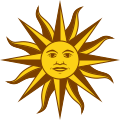
Back بوابة:الأوروغواي Arabic Portal:Uruguay German Portal:Uruguay Spanish Portail:Uruguay French Portale:Uruguay Italian Portal:Uruguay Malay Portal:Urugwaj Polish Portal:Uruguai Portuguese Портал:Уругвай Russian
| Portal | Participants | Templates | Tasks | Assessment | Popular Pages | Requests |
The Uruguay Portal
Uruguay, officially the Oriental Republic of Uruguay, is a country in South America. It shares borders with Argentina to its west and southwest and Brazil to its north and northeast, while bordering the Río de la Plata to the south and the Atlantic Ocean to the southeast. It is part of the Southern Cone region of South America. Uruguay covers an area of approximately 176,215 square kilometers (68,037 sq mi). It has a population of around 3.4 million people, of whom nearly 2 million live in the metropolitan area of its capital and largest city, Montevideo. The area that became Uruguay was first inhabited by groups of hunter gatherers 13,000 years ago. The predominant tribe at the moment of the arrival of Europeans was the Charrúa people. At the same time, there were also other tribes, such as the Guaraní and the Chaná, when the Portuguese first established Colonia do Sacramento in 1680; Uruguay was colonized by Europeans later than its neighboring countries. The Spanish founded Montevideo as a military stronghold in the early 18th century due to competing claims over the region, while Uruguay won its independence between 1811 and 1828, following a four-way struggle between Portugal and Spain, and later Argentina and Brazil. It remained subject to foreign influence and intervention throughout the first half of the 19th century. From the late 19th century to the early 20th century, numerous pioneering economic, labor, and social reforms were implemented, which led to the creation of a highly developed welfare state, which is why the country began to be known as "Switzerland of the Americas". However, a series of economic crises and the fight against far-left urban guerrilla warfare in the late 1960s and early 1970s culminated in the 1973 coup d'état, which established a civic-military dictatorship until 1985. Uruguay is today a democratic constitutional republic, with a president who serves as both head of state and head of government. In 2023, Uruguay was categorized as being a "full democracy" in The Economist Democracy Index, and is highly ranked in international measurements of government transparency, economic freedom, social progress, income equality, per capita income, innovation, and infrastructure. The country has fully legalized cannabis (the first country in the world to do so), as well as same-sex marriage and abortion. It is a founding member of the United Nations, OAS, and Mercosur. (Full article...) Selected article -Union Agriculture Group S.A. (UAG), is one of the largest Uruguayan agricultural producers and was founded in 2008 for production of rice, soybeans and wheat, as well as in the breeding of sheep and cattle. It was the first company in its sector (agribusiness) with shares traded on the Montevideo Stock Exchange (BVM). The company operates more than 100 farms, totaling about 516,000 hectares. The company's headquarters is in Montevideo, Uruguay. (Full article...) Selected picture - Mercado Modelo is a central municipal fruit and vegetable wholesale market in of Montevideo, Uruguay. Did you know -CategoriesSelect [►] to view subcategories
People -Pablo Gabriel Cuevas Urroz (Spanish pronunciation: [ˈpaβlo ˈkweβas]; born January 1, 1986) is a Uruguayan tennis coach and a former professional player. Cuevas won the 2008 French Open men's doubles title with Luis Horna, and was especially noted throughout his career for spectacular trickshots. He won six singles titles and has a career-high singles ranking of World No. 19 achieved in August 2016. His career-high doubles ranking is No. 14, achieved in April 2009. (Full article...) General imagesThe following are images from various Uruguay-related articles on Wikipedia.
Related portalsTopicsRecognized content
|
|||||
© MMXXIII Rich X Search. We shall prevail. All rights reserved. Rich X Search

































